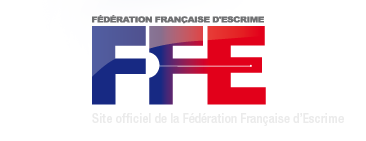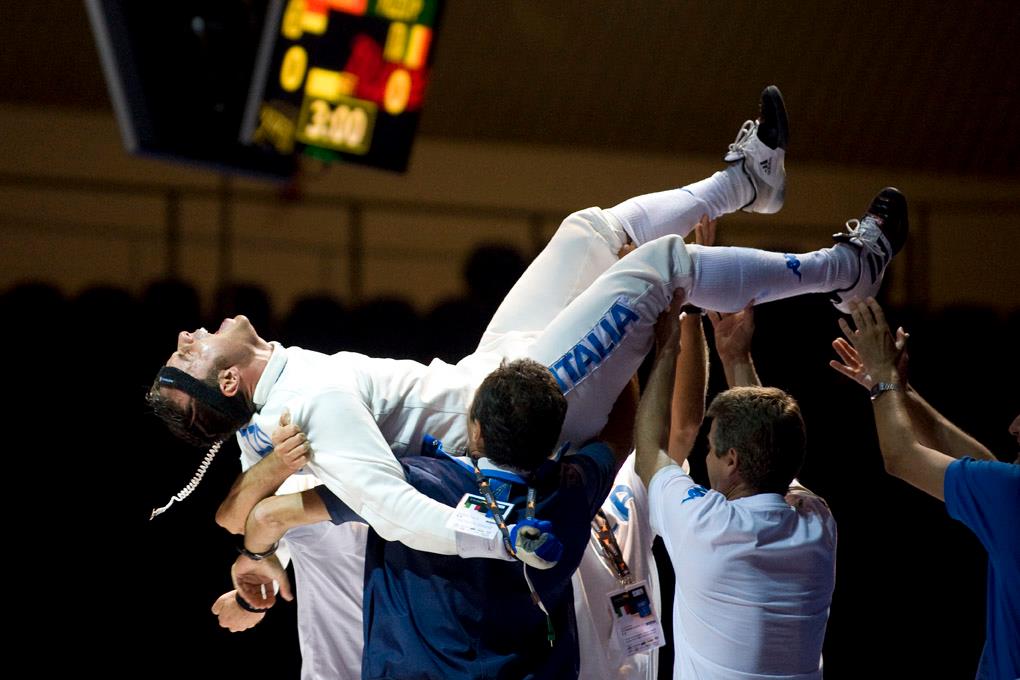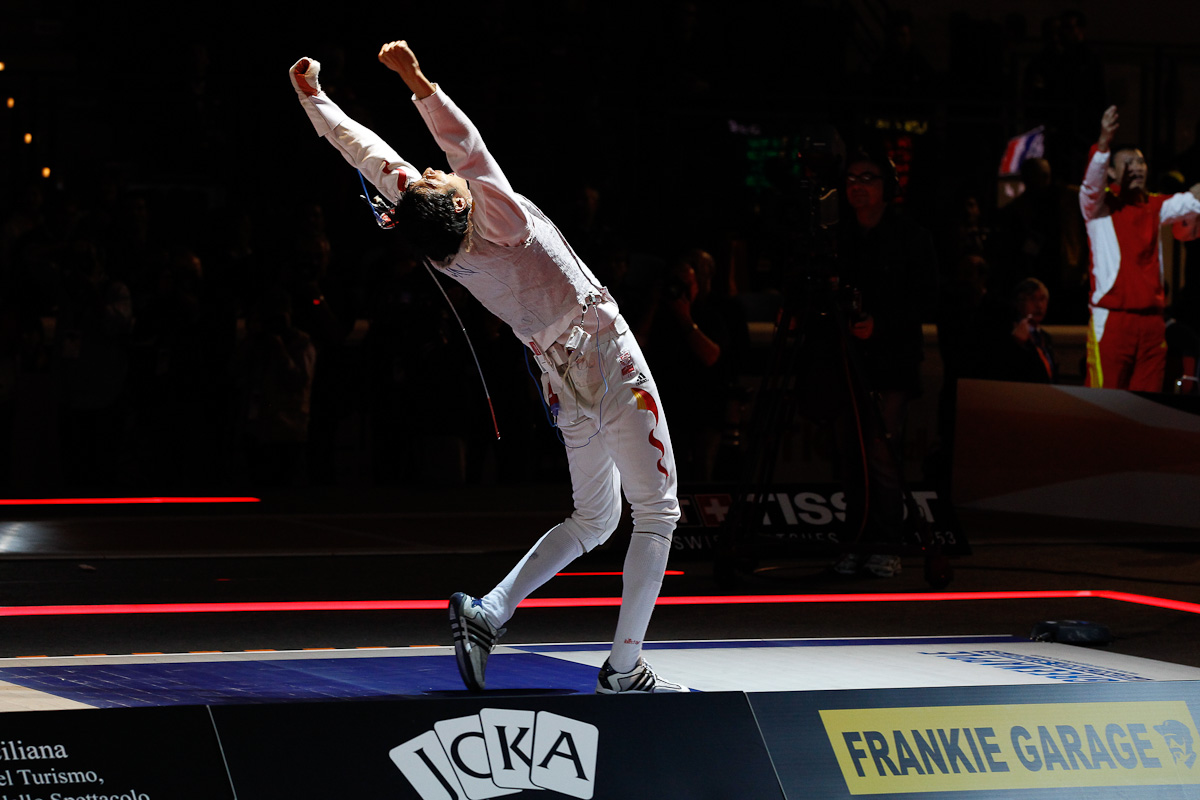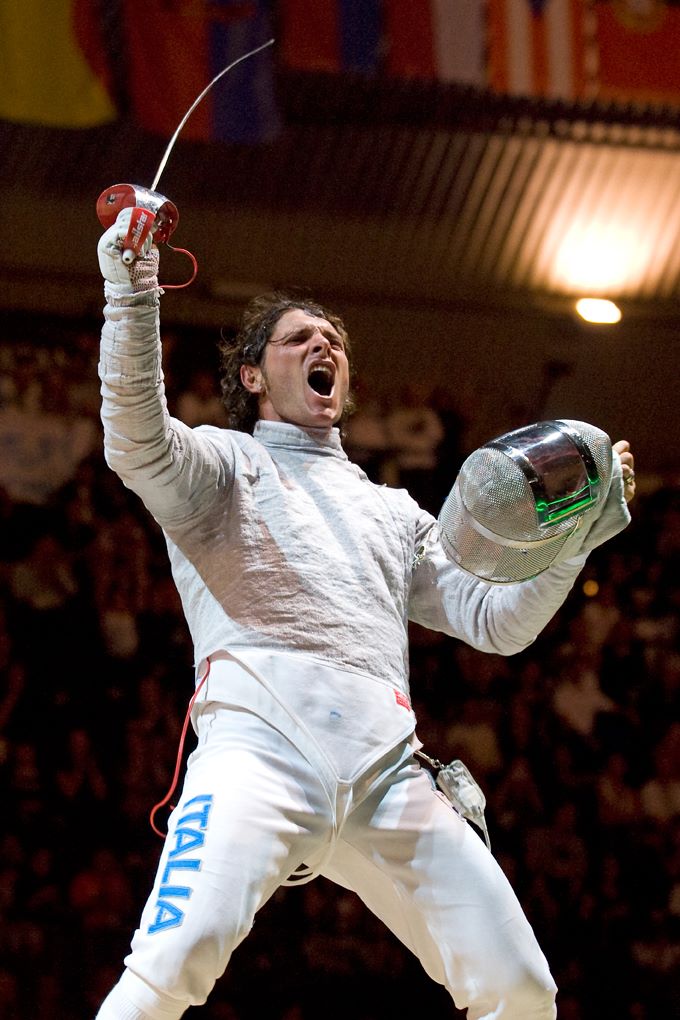 The French fencing team finished 5th in the Nations Ranking from the 2011 Fencing World Championships and 4th in the medals ranking with one Gold, one Silver, and one Bronze medal. France was one of 13 nations to earn a medal at the World Championships and one of 5 to earn a gold medal.
The French fencing team finished 5th in the Nations Ranking from the 2011 Fencing World Championships and 4th in the medals ranking with one Gold, one Silver, and one Bronze medal. France was one of 13 nations to earn a medal at the World Championships and one of 5 to earn a gold medal.
Where does that performance put France? Is it what the French were hoping for, especially considering that Italy ran away with the medal ranking with 11 medals?
Fencing.Net user Gladius was kind enough to translate this interview from the French Fencing Federation web site. After your read it, join the discussion of the French reaction to their performance.
Frédéric Pietruszka, Président of the Fédération française d’escrime and Eric Srecki, Directeur technique national of the FFE assess Catania 2011 World Fencing Championships
Q: With 3 medals and a fourth place in the medals table are these good results for team France in Catania?
Frédéric Pietruszka: “No, we can’t say that these results are good since we did not reach our goal of 4 to 6 medals. OTH it is not a disaster and some of our fencers have shown very nice things. If we had gotten two medals in individual épée like we did in Paris the results would have been satisfactory.”
Eric Srecki: “No. We could have gotten 5 medals.”
Q: The Italians matched the record for most medals earned in a world championships (11). Your thoughts?
Frédéric Pietruszka: “One should carefully analyze the Italian results. 4 individual titles out of 8 individual medals. No team title out of 3 team medals. Therefore, without a doubt a great success in individual events but a failure in team events. This said, the Italians are very powerful in all weapons and are well prepared for major international events.”
Eric Srecki: “Bravo! Right now they dominate, head and shoulders over and above anyone else.”
Q: 2001 in Nîmes and 2005 in Leipzig, team France earned ten medals. Are those days over?
Frédéric Pietruszka: “I don’t think those days are over. The potential is always there. Each team can get a medal and in individual competitions we can say that for each weapon we have at least one athlete who can reach the podium. The proof is in [our] world cup results. All we need is that all are present and ready on D day.”
Eric Srecki: “Maybe.”
Q: Criticism of the French squad could not wait. The press spoke of a ‘Bérézina,’ of a ‘crushing defeat’ but also of problems between fencers and coaches. Terms like ‘bérézina’ or ‘crushing defeat’ are they appropriate for describing this situation? What about the problems between fencers and coaches?
Frédéric Pietruszka: “Here too we must look at all this in the proper context. These were not successful championships [for us]. Everybody, fencers and coaches must take a new look at themselves.
Words like ‘Berezina’ and ‘crushing defeat’ are inappropriate when you return home with one gold medal with an épée team which has nailed its 8th consecutive victory, when foil missed gold by one touch, and Victor Sintès gained a bronze. Medals aside there are other encouraging signs.
- That Corinne Maîtrejean gave a really hard time to Vezzali before giving up, but also to Shaneva and Mohammed (15-3) is one positive sign.
- That Bolade Apithy, Erwann le Pechoux, Gauthier Grumier and Jean-Michel Lucenay could affirm their leadership in their teams is another positive sign.
- That Virginie Ujlaky beat Errigo, silver medal in Paris 2010.
- That Léonore Perrus and Marion Stoltz bowed honorably proves that we are not too far away.
Maybe the dialog between fencers and coaches is not there.
I always stated that the duo “coach-fencer” must operate in a close-knit working relationship, that they are two mature adults, where one has the job to coach and the other has the goal to win; that a constant exchange, that a mutual understanding of the problems of the other are absolutely necessary, and that to perform one must be in perfect physical condition and master the technical repertoire, be highly motivated, manage the technique flawlessly, be in a foolproof mental condition, and be always lucid when on the strip.
I ask everyone to analyze objectively everything he has done, what he has not done, what was missing [in his preparation] to be more effective.”
Eric Srecki: “We can understand the criticisms in the press but terms like ‘Berezina’ or ‘crushing defeat’ are exaggerated. Regarding possible problems between fencers and coaches, if they exist, they are the exception and they are addressed internally.”
Q: The French system was also compared to those of other countries, that of Italy in particular, which today represents a total success. In your opinion:
- Should we make some changes in the French system? And if so, what changes?
- Shouldn’t the clubs find again a true place in the core of the system?
- Shouldn’t the French teams open up to the outside world (international camps)?
Frédéric Pietruszka: “France has adopted a system which until now has produced results.
The less than stellar results of the past three years raise some questions to which we must find good answers.
- Is athletic performance at the highest level still compatible with the dual project under its current form?
- Does the way our staff manages and trains our teams help the performance?”
- Does the separation between age categories, cadets, juniors, and seniors competitions handicap a more rapid progression and the earlier competitiveness of our athletes?
- The greatly increased number of our fencers in the clubs which pushed the intial individual teaching to a common lesson could it not have harmed the performance in the long term?
- The fact that our coaches in order to make a better living have more things to do in the clubs, limits his availability to individual students, isn’t this harmful?
I have always lamented the lack of openness of our coaches. I think that with the results and the questions we are now asking things are changing.
As for the clubs, they have their place. If you want to talk about training groups/centers that would replace the group INSEP, this may be a possible alternative, but I doubt that everyone finds the present conditions reflecting his situation.
I wish for everybody to look in the mirror and ask this question: did I do the maximum as far as physical preparation, training, healthy living, rest and recovery to be in top shape for these championships? I cannot put myself in other people’s place but each individual can and should.”
Eric Srecki: “For sure, the overall strategy of the high performance program will be reviewed, as we do every four years in the framework of the next Program for sport excellence, in this case for the period 2013-2017. With regards to Olympic qualifications we will have to make some fine tuning, not systemic changes.
As to the question about the clubs the answer is no, since the clubs have already an important role.
Opening up to the outside world? Maybe, this is something worth studying with coaches and athletes but this season we have had exchanges with other national teams: Japan, Canada, Russia, Great Britain.”
Q: Once more, men’s épée team won in Catania and achieved a historical record. Why can’t the other weapons imitate them?
Frédéric Pietruszka: “We must acknowledge the 8th [consecutive] victory of the men’s épée team for what it really is. It is an exceptional performance which explains also why other weapons have not been able to imitate.
However, foil has seen its dyanamic reborn after the interruption in Beijing where foil did not have a team event. Let’s make sure that this does not happen for épée also.
These are the weapons which are the most reliable.
WS has not yet replaced Anne-Lise Touya.
MS has suffered because of a below par performance by Nicolas Lopez.
WE is not far from the best, but they are struggling to close their bouts.
WF are not too far from the best. This team must become aware of its value. But it is hard when they tell you for the past twenty years that you are not there yet.”
Eric Srecki: “I have no idea [why the other weapons don’t have these results].”
Q: What are the positive moments you remenber about Catania 2011 world championships?
Frédéric Pietruszka: “Positive moments were several and I already cited a few.
I will remember the way men’s épée (team) fenced.
Second, the revival of MF with two medals, one of them the only individual medal with Victor Sintès and the huge contribution by Erwann le Pechoux in the team event (+ 45 for the day). If he can fence like this at the Olympics he has the potential to become Olympic champion in London.
WF should have brought home one or two medals with Corinne Maitrejean and her great 8 minutes and 30 seconds over Vezzali and the spirit which came out after the known difficulties in Sheffield, a reaction which I would have liked to see crowned with a collective medal.
Like I said at the beginning, of course, there are some concerns, questions, re-considerations, but isn’t this typical of the highest level?
Personally I believe that the potential is always there but we need to have exchanges, a dialog for making it real.”
Eric Srecki: “The three medals and the solidarity inside the technical staff.”
Questions by Denis Goran






